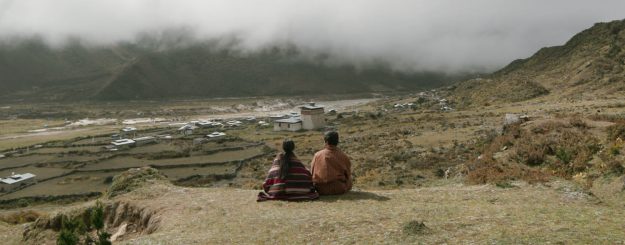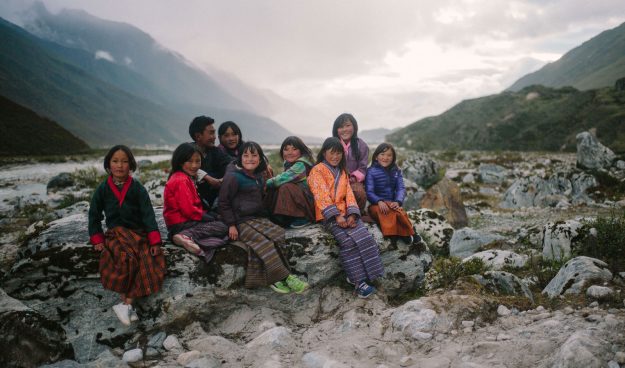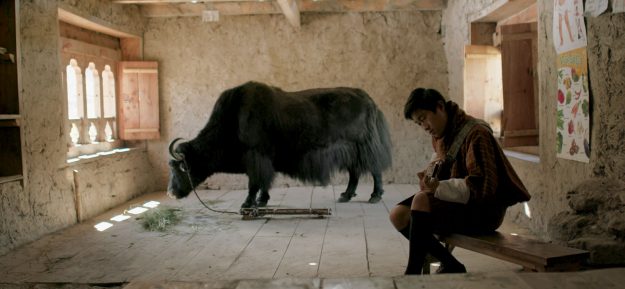Buddhist teachings tell us that the antidote to our propensity for suffering is the noble eightfold path, guidelines that promote ethical conduct infused with compassion and wisdom. Yet in our day-to-day we cling to what we think are the ideal conditions for our personal happiness—the perfect relationship, passion, career, or city to live in that we imagine will bring us fulfillment. The recently released film from Bhutan, Lunana: A Yak in the Classroom, however, offers cinematic proof for the deeper sources of happiness within us.
Lunana had its US premiere in January of this year at the Palm Springs International Film Festival and its New York premiere in September as part of the New York Asian Film Festival, which was held virtually. Honored as the opening selection at the Film Festival Della Lessinia in Italy, where it won Best Film, it was recently selected to represent Bhutan at the Oscars in the International Feature Film category. (This is only the second time that the tiny Himalayan nation has had an Oscar entry; the first was Dzongsar Khyentse Rinpoche’s movie The Cup, in 1999.)
This understated gem-in-the-rough is the handiwork of Pawo Choyning Dorji, a promising young filmmaker from this Himalayan Buddhist kingdom who learned his craft while assisting renowned lama and filmmaker Dzongsar Khyentse Rinpoche on the film Vara: A Blessingand later producing Hema Hema: Sing Me a Song While I Wait. The film draws us into the inner conflict of Ugyen, a young Bhutanese urbanite who sports jeans, a T-shirt with a slogan for Bhutan’s Gross National Happiness initiative, and a big set of headphones that block out the sounds around him. Ugyen dreams of breaking free of the constraints of his homeland for the promise of bigger places (Australia) in pursuit of a big-time singing career. The conflict: Ugyen has one year left on his teaching contract to pay for his government-sponsored degree. (The Bhutanese state meets its mandate to provide quality education for all citizens, regardless of how remote their locale, by offering qualified candidates a free education towards a teaching degree with the expectation that they will serve out a teaching placement equal to twice the time of their schooling.)

Although Ugyen hopes to avoid this final year of service and launch his personal plans, the education ministry assigns him to a post in Lunana, one of the most remote villages in Bhutan and probably the world. On the day of his departure, Ugyen says goodbye to his friends at the bus station and then, wearing his headphones, settles in for the long and bumpy ride north to the village of Gasa. There, he is met by two yak herders from Lunana, who will accompany him the rest of the way on the arduous, high-altitude, eight-day trek.
On the trail, Ugyen’s headphones give out and he finally hears the sounds of the surrounding environment─birdsong and the touching folksong of the yak herders:
Like milk in a porcelain cup,
The heart is pure.
So pure that even if the cup breaks,
The milk remains milk.
Like water in a vase,
The heart is clear,
So clear that infinite beauty
Is reflected in its depth.
Two hours outside of Lunana, the entire village awaits Ugyen, waving khatas, white ceremonial scarves, to welcome and escort him the rest of the way. This reception, traditionally given to high lamas and royalty, alludes to the esteem with which they hold their new teacher. The villagers deliver Ugyen to the school─a ramshackle room with mud walls and a couple of dust-covered tables. The hopeful children listen expectantly through the unglazed windows, showing no reaction as Ugyen tells the village headman that he wants to leave immediately. The headman agrees to fulfill his request, but only after the pack horses have had a few days of rest.

Of course, what transpires during those days changes our reluctant hero’s mind. The bright-eyed school children, played by the real children of Lunana, become true teachers in this story, as they demonstrate their unfaltering aspiration for a formal education.
With scant teaching supplies, Ugyen relies on his creativity, writing all the lessons directly onto the mud walls using pieces of charcoal. When the children run out of writing paper, Ugyen resupplies them by cutting up the traditional, handmade paper panels that the villagers had installed over his windows as insulation from the cold.
As Ugyen begins to invest himself in teaching, his friends from home send a box of supplies, including a basketball and his guitar. In a scene of pure delight, the children frolic in a circle dance under the stunning Himalayan mountain backdrop as two yak herders serenade them with their favorite folksong and Ugyen heartily sings along playing his guitar.
Watching, I understood in this scene Dorji was presenting one vision of profound happiness: a happiness uncomplicated by achievements of fame or fortune, grown from an interdependent sense of community and sufficiency mutually created and shared. This idea lies at the heart of Bhutan’s governmental policy of Gross National Happiness (GNH), which is an outgrowth of the country’s deeply embedded Buddhist character and identity. The Buddhist view that everything exists in a state of inter-relativity is key to its understanding of happiness. Enduring happiness is not self-centered or acquisition-based, but rather inclusive: happiness that exists in relationship to others and the environment. In this case, happiness generated through Ugyen’s talent and creativity was used to uplift a community in need.

And what is the story of that yak─the permanent fixture in the classroom? His name is Norbu, which means “wish-fulfilling jewel,” a symbol used in Himalayan Buddhist culture to describe one’s lama, or teacher. Although the yak provides an important function for the schoolhouse and the people of Lunana (furnishing a never-ending supply of dung used as fuel for heat), he is in fact a metaphor for Ugyen, who becomes Lunana’s wish-fulfilling teacher.
The film unfolds with the unhurried but steady pacing of a Bhutanese highlander’s trek. The rough and spare highland conditions─no running water, heat, or electricity─are presented with a touch of humor. The movie crew lived on location in the isolated village of Lunana, at an altitude of over 5,000 meters above sea level, for two months. (Dorji admitted in an interview to having only one shower during the entire duration of shooting.) Some of the actors had never even watched a movie. Because of the lack of electricity, the film was shot using solar-powered batteries. As energy had to be used sparingly, Dorji was unable to engage in the usual process of reviewing the raw, unedited footage before leaving the village.
Dorji wrote and directed Lunana with a restrained hand, allowing the simplicity and uncontrived kindheartedness of the Bhutanese villagers to speak for itself. But he offers a very direct message to Bhutanese young people to consider how they can invest their knowledge and skills in fulfilling the needs and dreams of their own country and people rather than running off for imagined opportunities abroad. Aside from this particular plea, Lunana reveals universal truths, or dharma, about happiness and self-realization and how harnessing our individual strengths to benefit many is the most rewarding happiness of all.